Pitch Your Game to Target
10 Jan
Posted by David Miller as Card Games, CCGs, Modern Board Games, Other
 Game and toy inventors hoping to see their design on the shelves of a major retailer have a unique opportunity over the next month with Target. The company has launched what it’s calling the Target Open Innovation Project and is taking applications for direct meetings at New York Toy Fair in February.
Game and toy inventors hoping to see their design on the shelves of a major retailer have a unique opportunity over the next month with Target. The company has launched what it’s calling the Target Open Innovation Project and is taking applications for direct meetings at New York Toy Fair in February.
We want early access to inventors and companies with fresh ideas and in exchange, will offer the opportunity to pitch your idea to a panel of Target Toy buyers and get feedback from experts in Mass Retail. We intend for these meetings to produce a meaningful pipeline of innovation for our Toy Assortment.
Initial applications are due January 17th and require information on the product’s target audience and how it differs from current products. Also asked is whether the inventor has performed any market studies, patent searches, or cost analysis.
Target is looking for products in the following categories: games, dolls, activity sets, pre-school toys, and imaginative play.
- Comments Off on Pitch Your Game to Target
Unpub, A Different Sort of Game Convention
21 Mar
Posted by David Miller as Card Games, Miniatures, Modern Board Games
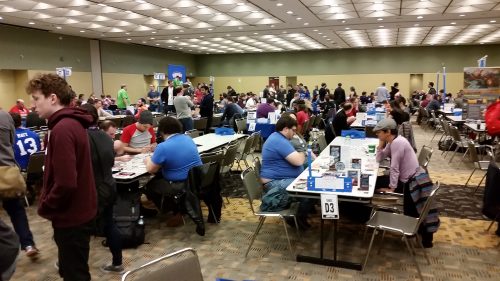
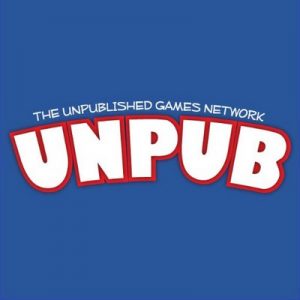 A game convention of a different sort took place this past weekend in Baltimore. Rather than featuring the hottest new releases, this annual event specifically focuses on the rudimentary and undeveloped game concepts that have yet to make their way to store shelves. Though attendance is free, it takes more than a passing interest to put in several hours on a Saturday or Sunday afternoon playing games with half-baked rules and rough pieces instead of nice plastic pawns and printed boards.
A game convention of a different sort took place this past weekend in Baltimore. Rather than featuring the hottest new releases, this annual event specifically focuses on the rudimentary and undeveloped game concepts that have yet to make their way to store shelves. Though attendance is free, it takes more than a passing interest to put in several hours on a Saturday or Sunday afternoon playing games with half-baked rules and rough pieces instead of nice plastic pawns and printed boards.
Still, around 1,700 people showed up to this year’s Unpub convention and volunteered their time to help inventors and small publishers improve their products. With a sense of adventure, they made their way around 100 or so tables being guinea pigs but also sharing their ideas and perhaps getting an early peek at what could be next year’s hot title.
At these tables, designers floated new ideas, tested untried innovations, and ran their works through the paces. Developing a game from initial concept to final product requires a lot of repeated play. Unpub allows independent and budding designers to take advantage of the crowd of ready playtesters to try different alternatives on the spot.
As explained to me by Jason Kotarski of Green Couch Games, the convention is also a great occasion for publishers. In addition to testing his own games, Jason was there scouting for new projects and even took the opportunity to do some promotion for Ladder 29, a firefighting family card game that his company is currently crowdfunding.
On Friday, before the two days of open playtesting, Unpub hosted a series of professional seminars just for the designers. One was led by Zev Shlasinger, founder of Z-Man Games and currently Director of Board Games for WizKids. Another provided some behind-the-scenes industry insight for those new to the business side of games. A third, by Panda Game Manufacturing, a major sponsor of Unpub, was on the process of game production.
Brent Kinney of Panda told me that the company “feels a strong connection with the independent design community.” It was manufacturing for self-publishers and Kickstarter projects that launched Panda. And the show provides the company not only an opportunity to advise aspiring publishers on manufacturing costs and considerations, but also to learn what types of new components—some of them quite innovative ideas—Panda should consider adding to its capabilities.
Back on Sunday, when I visited Unpub, I had the privilege of playtesting three games. The first was a yet-to-be-named tabletop board game implementation of Japanese-style computer RPGs from designer Luke Peterschmidt. Though this was not the kind of game that I usually go for, I did enjoy learning its combat mechanics and thought they seemed pretty solid. The second was Party Poetry by Sheri Knauth, a game in which the players each secretly contribute one line to a larger poem and then vote on which amalgamation they consider the best. Again, not a game I would usually choose, but I was feeling venturous and was impressed by the poetry that can come out of such a process. The third game, Rain Dance by Matt Loomis and Isaac Shalev, was definitely more my style and seemed nearly ready-to-go. Simple cards allow players to plant, water, and harvest crops, while the choice of replacement cards allows them to flood out the crops of their opponent.
And though I didn’t get a chance to play it, probably the most exciting news out of Unpub for me personally was that Dave Chalker is working on a Midnight at the Well of Souls board game based on the novel series by his father, science fiction author Jack Chalker. During high school, I devoured every one of his books as they came out.
Unpub is a tremendous asset to game designers and a wonderful experience for those interested in seeing some of the process behind their favorite entertainment. Look for it again next year in Baltimore, March 23-25.
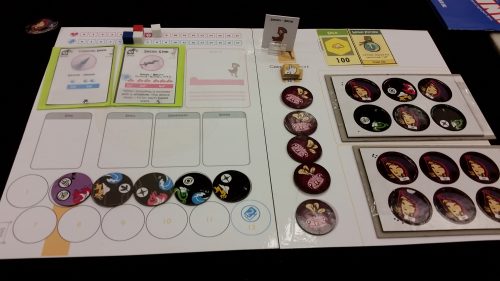
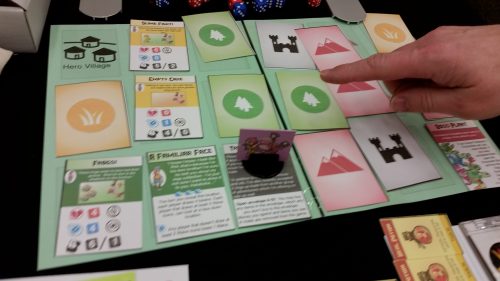
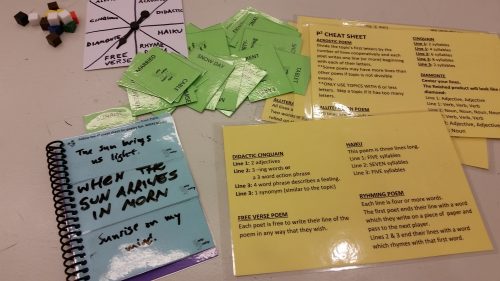
Three Game Design Competitions
10 Dec
Posted by David Miller as Card Games, Electronic Games, Modern Board Games
 Cardboard Edison, which does a fantastic job of collecting game design and publishing advice, has in this case collected 35 judges (publishers, reviewers, and designers) to evaluate “engagement and originality” and bestow The Cardboard Edison Award on one unpublished board game. Though prototypes will only be required of those designs that make it to the second stage of evaluations, anyone wishing to participate must pay a $5 fee. There is no prize for winning. Submissions are due January 31st and remain the property of their designers.
Cardboard Edison, which does a fantastic job of collecting game design and publishing advice, has in this case collected 35 judges (publishers, reviewers, and designers) to evaluate “engagement and originality” and bestow The Cardboard Edison Award on one unpublished board game. Though prototypes will only be required of those designs that make it to the second stage of evaluations, anyone wishing to participate must pay a $5 fee. There is no prize for winning. Submissions are due January 31st and remain the property of their designers.
Sponsored by The Pericles Group and hosted by The Game Crafter, the Learning Game Challenge seeks games “where a playful environment creates an opportunity for understanding real world problems and issues.” The audience doesn’t matter but the learning objectives must be clear. Entries must also be games newly uploaded to The Game Crafter specifically for the contest, and they have to be complete, publish-ready, with all components and packaging priced under $30. The winner retains all rights and will receive a $100 cash prize, $50 of shop credit, 100k crafter points, and showcase status. Entries are due February 29th.
Administered by Games for Change and sponsored by Transformance, the Pocket Change Game Design Challenge seeks submissions that “introduce the basic concepts of savings and outline what players need to start overcoming debt and building their wealth.” There’s a $10,000 prize. And while the Challenge is technically open, there is a stated preference for web-based games targeting young adults. The deadline for entries is January 22nd.
- Comments Off on Three Game Design Competitions
 Watch out human game designers, your days may be numbered!
Watch out human game designers, your days may be numbered!
An artificial intelligence named Scheherazade, created by researchers at the Georgia Institute of Technology, has developed choose-your-own-adventure games that test nearly equal to those developed by a human.
At this point, human authored interactive narrative still remains the most cost-effective means of generating an interactive narrative experience. However, open interactive narrative shows promise in reducing authorial burden in the near future. Scheherazade-IF and the lessons we learned in creating and evaluating it serve as a first step in creating human-quality interactive narrative with almost no human authoring required.
This was among the conclusions reached after a study [PDF] that had the AI produce interactive fiction for two scenarios, one involving a bank robbery and the other a date to a movie.
In fact, this is not the first time a programmed system has authored a game scenario. What allowed these results to test so well, however, was a crowdsourcing approach adopted by the researchers. Alternate stories for the way each scenario might unfold were collected through the Amazon Mechanical Turk platform. From the language of those stories the AI assembled the branching narratives.
[via CNET]
- Comments Off on AI Game Designer
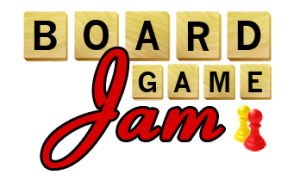 March 7-8 in Toronto is a board game jam open to the public.
March 7-8 in Toronto is a board game jam open to the public.
We provide the materials, you provide the imagination.
That’s the basic concept of this fifth annual event. On Saturday morning, people will gather at George Brown College for an introductory pep talk on game design. Then teams will break out with the goal of producing a playable prototype by 6:00 PM Sunday. Beginners are especially welcome.
Money from the $25 ticket charge goes towards the materials provided.
- Comments Off on Toronto Board Game Jam
Cardboard Edison, a terrific service that pulls together tips and links for game designers, recently surveyed its published readers regarding their experiences with license contracts. The result is some fantastic data on what game designers can expect when selling their work to publishers.
Two infographics based on that data—one for pre-publication terms and one for post-publication—have been posted by Cardboard Edison so far. Among the issues addressed are royalty rates and advances, payment schedules, the reversion of rights, and creative control.
With this information from Cardboard Edison we can estimate the riches earned by designers from their games. Let’s take a game that sells at retail for $30. The wholesale price at which that game was sold by the publisher is probably around 50% of retail, or $15. Most designers earn royalties as a fixed percentage of wholesale price, typically 5-8 percent. So from the sale of one copy of that $30 game, the designer probably gets $0.75-1.20. If a game has a print run, and sells out, of 10,000 copies, that’s between $7,500 and $12,000 in total.
- Comments Off on Contract Terms for Game Designers
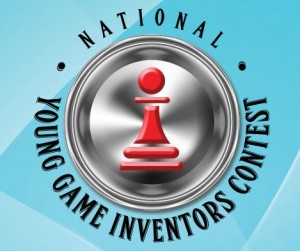 Cosponsored by Toys “R” Us and Scholastic Parent & Child magazine, University Games’ 22nd annual National Young Game Inventors Contest offers the grand prize winner a $10,000 savings bond, a $250 gift certificate to Toys “R” Us, and a family trip to San Francisco. The contest is open to board games designed by children age 5-12. University Games may publish the winner but no further royalties will be paid.
Cosponsored by Toys “R” Us and Scholastic Parent & Child magazine, University Games’ 22nd annual National Young Game Inventors Contest offers the grand prize winner a $10,000 savings bond, a $250 gift certificate to Toys “R” Us, and a family trip to San Francisco. The contest is open to board games designed by children age 5-12. University Games may publish the winner but no further royalties will be paid.
The deadline for submitting game prototypes is October 15th.
- Comments Off on National Young Game Inventors Contest
 Marbles is running a game design competition they’re calling, “Who’s Got Game?“. The company is looking for “unique” “pattern games” for 1-2 adult players.
Marbles is running a game design competition they’re calling, “Who’s Got Game?“. The company is looking for “unique” “pattern games” for 1-2 adult players.
While the deadline is short—this Friday, August 1st—only photos and a description are required (prototypes are optional). The grand prize is also pretty nice—$2,000, an appearance on the National Geographic Channel’s Brain Games, production and distribution by Marbles, and a 5 percent royalty on retail sales.
Other than the winning entry, entrants retain rights to their submissions.
- Comments Off on Marbles Game Design Competition
NaGa DeMon
29 Oct
Posted by David Miller as Card Games, Miniatures, Modern Board Games, RPGs, War Games
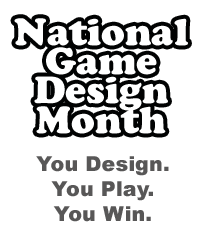 NaNoWriMo is National Novel Writing Month, the annual group challenge to write a novel, start to finish, during the month of November. Nathan Russell would like gamers to adopt the idea with NaGe DeMon, National Game Design Month. The idea is to take a game from concept to playtested prototype in 30 days. A challenge indeed!
NaNoWriMo is National Novel Writing Month, the annual group challenge to write a novel, start to finish, during the month of November. Nathan Russell would like gamers to adopt the idea with NaGe DeMon, National Game Design Month. The idea is to take a game from concept to playtested prototype in 30 days. A challenge indeed!
Trending
- Massdrop.com
- Oh the Irony—Illuminati Card Game Continues to Inspire Conspiracy Theorists
- Home
- Footprints, an Educational Ecology Game
- USPS Adds Board Game Flat Rate Box
- Baila, the Estonian Drinking Card Game
- Crystal Caste Wins Dice Patent Suit Against Hasbro
- Mirror Game, Red and Blue
- Hasbro and Mattel Merger?
- Are Board Games Dangerous?
Archives
Most Popular Articles
- Oh the Irony—Illuminati Card Game Continues to Inspire Conspiracy Theorists
- The 20 Most Valuable Vintage Board Games
- The Truth About Dominoes On Sunday in Alabama
- Sequence Game, and Variants
- USPS Adds Board Game Flat Rate Box
- Baila, the Estonian Drinking Card Game
- The 13 Most Popular Dice Games
- Are Board Games Dangerous?
- Guess Who? The Naked Version
- What Happened to the Jewel Royale Chess Set?
Recent Posts
- Toy Fair 2019—Breaking Games
- Talisman Kingdom Hearts Edition
- Toy Fair 2019—Winning Moves
- Toy Fair 2019—Games Workshop
- Toy Fair 2019—Star Wars Lightsaber Academy
- Toy Fair 2019—Stranger Things Games
- Toy Fair 2019—HABA
- Licensing Roundup
- Game Bandit
- 2018 A Difficult Year For Hasbro But Not For D&D Or MtG
Recent Comments
- on Toy Fair 2019—Winning Moves
- on Game Bandit
- on Second Look—Dungeons & Dragons Waterdeep Dragon Heist
- on Crowdfunding Highlights
- on Beyblade SlingShock
- on Game Bandit
- on Game Bandit
- on Watch This Game!, the Board Game Review Board Game
- on Second Look—Vampire: The Masquerade 5th Edition
- on Palladium Books Loses Robotech IP License, Cancels Five-Year-Overdue Robotech RPG Tactics Kickstarter






